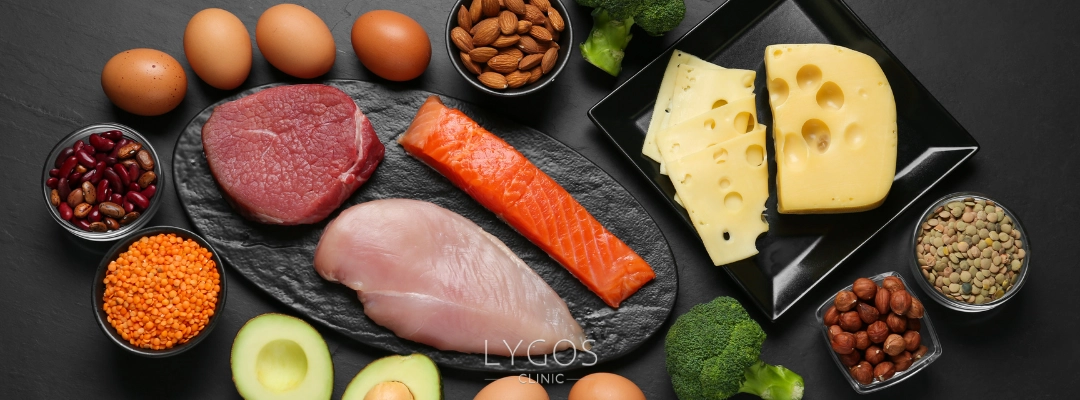What is Amino Acids? | Benefits and Food Sources | LYGOS 2025

What do Amino Acids Do?
Amino acids are the basic building blocks that all living things use for protein synthesis. The functionality and structural differences of proteins result from the diversity in the sequence of amino acids. Therefore, each type of protein has its own specific function.
For example, they play a role in many vital functions, from strengthening muscles to supporting the immune system. Amino acids are of great nutritional importance and are most abundant in protein-rich foods such as red meat, chicken, fish and soybeans. These foods are excellent sources of the proteins the body needs and support overall health. So, what are amino acids? What do amino acids do?
What are Amino Acids?

Amino acids are the building blocks of proteins, which are essential for the body to maintain its vital functions. Each protein performs different tasks with its unique arrangement of amino acids. The human body needs 20 types of amino acids for the healthy functioning of these biological processes. Of these 20 amino acids, 9 are known as essential amino acids because they cannot be produced by the body and can only be obtained through diet.
The remaining 11 amino acids are called non-essential amino acids; these amino acids can be synthesized by the body. However, in some special cases, the need for these non-essential amino acids increases and they must be taken from outside. These amino acids are called semi-essential amino acids. To summarize, amino acids are the building blocks of the body’s basic functioning and proper nutrition is important for maintaining this balanced system.
What are the Different Types of Amino Acids?

Amino acids vary with different molecular structures according to the needs of the body, and this diversity forms the building blocks of proteins. Nutritionally, there are three main groups of amino acids:
- Essential Amino Acids: These amino acids, which cannot be produced by the human body, must be taken from outside with food. Some important amino acids in this group and the foods that contain them are as follows:
- Threonine: Found in beef.
- Lysine: Present in chicken meat.
- Valine, Leucine, Isoleucine: Found in chicken, beef and eggs.
- Phenylalanine: Found in peas and pumpkin seeds.
- Tryptophan: Found in soybeans.
- Methionine: Found in fish such as salmon.
- Conditionally Distributable Amino Acids: These amino acids are synthesized in the body with the help of other amino acids. Examples
- Histidine: Found in fish.
- Arginine: Found in peas, peanuts and pumpkin seeds.
- Serine, Tyrosine, Cysteine: Found in chicken, beef, eggs and dairy products.
- Distributable Amino Acids: Produced by the body itself, these amino acids are abundant in everyday life. Examples:
- Glycine, Alanine: Found in chicken, beef, eggs and dairy products.
- Proline: Found in wheat and soybeans.
- Asparagine, Aspartic Acid: present in legumes.
- Glutamine, Glutamic Acid: Found in lentils, wheat and soybeans.
These groups of amino acids are critical for the healthy functioning of the body and the maintenance of life functions. Adequate dietary intake supports overall health.
What Do Amino Acids Do?

Amino acids are essential compounds that play a critical role in the functioning of the human body. Of the approximately 270 known amino acids, only 20 have important functions in the human genome. Of these 20 amino acids, 8 cannot be produced by the body and must be obtained from the diet. The other 12 amino acids can be synthesized by the body. However, an adequate supply of the 8 essential amino acids that must be taken from outside is important for a healthy life. So, what are amino acids for?
Amino acids have many important functions in the body. First of all, they support skin health by forming the structure of the skin. They also help maintain muscle mass by contributing to the synthesis of muscles. They also contribute to strengthening the immune system and protect the body against diseases. Amino acids, which also have an effect on brain function, help to transmit signals.
They are involved in many vital processes such as the transportation and storage of nutrients, protein formation, and the control of hormone production. They also regulate the structure of cells and bones and contribute to the healthy functioning of the cardiovascular system. In conclusion, amino acids are vital not only for protein synthesis, but also for the overall health and function of the body. Therefore, getting enough amino acids through a balanced diet is essential for a healthy life.
What Foods Contain Amino Acids?

Amino acids are the cornerstones of a healthy diet and are found naturally in a variety of foods. Different food groups offer unique amino acid profiles, ensuring that our diet is rich and balanced. When looking for an answer to the question “What contains amino acids?”, it is important to consider food sources from a broad perspective.
Animal sources generally offer a richer profile of amino acids. Animal foods such as meat, fish and poultry provide all the essential amino acids the body needs, while milk and dairy products are also very valuable in this respect. On the other hand, plant sources also contain many amino acids, but are often complementary. Therefore, combining different plant protein sources can create a complete profile of essential amino acids.
Also, the question of what contains amino acids can be answered as follows:
- Apple: Generally known as a source of vitamins and fiber, apples contain amino acids, albeit in low amounts. The amino acids in these fruits contribute to processes such as energy production and cell regeneration.
- Orange: Famous for their vitamin C content, oranges also contain small amounts of amino acids. These compounds support the immune system and skin health, boosting overall energy levels.
- Almond: Almonds: Almonds are an important source of plant protein, especially essential amino acids. For those with amino acid deficiencies, almonds can be a valuable part of the diet, supporting muscle building and energy production.
- Spinach: Spinach, which stands out among green leafy vegetables, is rich in amino acids. This vegetable, which contains amino acids especially for muscle building and repair, also draws attention with its protein content.
- Chicken Meat: As one of the animal protein sources, chicken meat is extremely rich in essential amino acids. Offering a complete amino acid profile, chicken plays a role in important processes such as muscle development and immune system support.
- Milk Products: Dairy products such as milk, yogurt and cheese are known for their rich amino acid content. These foods provide all the essential amino acids needed for muscle building and tissue repair, making them an ideal source to meet daily needs.
- Lentil: Lentils have one of the richest amino acid profiles among plant protein sources and are especially important in vegetarian and vegan diets. Rich in both essential and non-essential amino acids, lentils are an essential part of a healthy diet.
In conclusion, the importance of amino acids for the body cannot be overstated. Creating a rich diet by utilizing different food sources is a great step towards supporting our health.


